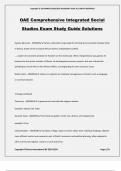Copyright © OLIVIAWEST2024/2025 ACADEMIC YEAR. ALL RIGHTS RESERVED
OAE Comprehensive Integrated Social
Studies Exam Study Guide Solutions
Kwame Nkrumah - ANSWER✔✔-African nationalist responsible for forming the Convention Peoples Party
in Ghana; leader of the 1st black African state to independence (1957).
..., Leader of nonviolent protests for freedom on the Gold Coast. When independence was gained, he
became the first prime minister of Ghana. He develpoped economic projects, but was criticized for
spending too much time on Pan-African efforts, and neglecting his own countries' issues
Nation State - ANSWER✔✔-citizens or subjects are relatively homogeneous in factors such as language
or common descent.
Portugal and Brazil
Theocracy - ANSWER✔✔-A government controlled by religious leaders
Example: Vatican City- Pope
Dynastic Cycle - ANSWER✔✔-the historical pattern of the rise, decline, and replacement
example: China
Collectivization - ANSWER✔✔-Creation of large, state-run farms rather than individual holdings; allowed
more efficient control over peasants; part of Stalin's economic and political planning; often adopted in
other Communist regimes. Used in U.S.S.R and China.
Copyright ©Stuvia International BV 2010-2024 Page 1/31
, Copyright © OLIVIAWEST2024/2025 ACADEMIC YEAR. ALL RIGHTS RESERVED
Globalization - ANSWER✔✔-Actions or processes that involve the entire world and result in making
something worldwide in scope
Modernization - ANSWER✔✔-The process of reforming political, military, economic, social, and cultural
traditions in imitation of the early success of Western societies, often with regard for accommodating
local traditions in non-Western societies.
Periodization/Chronology - ANSWER✔✔-Historian's attempt to break down history into managable
segments
Fredrick Jackson Turner- Frontier Thesis - ANSWER✔✔-Historian during the 1890s who wrote _____
which argued that the continuous existence of the American
_____ had shaped the character of the nation, and the end of this _____marked the end the first chapter
in American history.
Charles Beards - ANSWER✔✔-historian who argued that the Founders were largely motivated by the
economic advantage of their class in writing the Constitution
Karl Marx - ANSWER✔✔-1818-1883. 19th century philosopher, political economist, sociologist,
humanist, political theorist, and revolutionary. Often recognized as the father of communism. Analysis of
history led to his belief that communism would replace capitalism as it replaced feudalism. Believed in a
classless society.
European Industrialization - ANSWER✔✔-shook peasantry loose from ancient habits and customary
occupations; many unemployed; drained out of countryside into cities; immigration to America was a by-
product of urbanization in Europe
Copyright ©Stuvia International BV 2010-2024 Page 2/31
, Copyright © OLIVIAWEST2024/2025 ACADEMIC YEAR. ALL RIGHTS RESERVED
Neolithic Revolution - ANSWER✔✔-(10,000 - 8,000 BCE) The development of agriculture and the
domestication of animals as a food source. This led to the development of permanent settlements and
the start of civilization.
Human civilization - ANSWER✔✔-born 8000 years in the fertile crescent. Grain cultivation. agriculture,
long distance trade, urbanism.
social differentiation - ANSWER✔✔-A process in which people are set apart for differential treatment by
virtue of their statuses, roles, and other social characteristics
economic specialization - ANSWER✔✔-individuals or groups of people who concentrate on one product
or service
early civilizations - ANSWER✔✔-10,000-2,500 BC - brought the following: alphabets, math, time
measurements; art/architecture; alphabetic writing; defined religion; commonality/diversity
ex: Egypt, Mesopotamia, Gupta
Egyptian Empire - ANSWER✔✔-By 1500 B.C.E., the ______________ was an imperial state that bridged
Africa and Southwest Asia.
Mesopotamia - ANSWER✔✔-first civilization located between the Tigris & Eurphrates Rivers in present
day Iraq; term means "land between the rivers;" Sumerian culture
Gupta Empire - ANSWER✔✔-(320-550 C.E.) A powerful Indian state based, like its Mauryan predecessor,
on a capital at Pataliputra in the Ganges Valley. It controlled most of the Indian subcontinent through a
combination of military force and its prestige as a center of sophisticated culture.
Copyright ©Stuvia International BV 2010-2024 Page 3/31
, Copyright © OLIVIAWEST2024/2025 ACADEMIC YEAR. ALL RIGHTS RESERVED
Western Civilizations - ANSWER✔✔-The concept of ______ culture is generally linked to the classical
definetion of the ______ world. In this definition, ______ culture is the set of literary, scientific, political,
artistic and philosophical principles which set it apart from other civilizations. Much of this set of
traditions and knowledge is collected in the ______canon.
Near East - ANSWER✔✔-The region between the Eastern coast of the Mediterranean Sea and the Tigris
and Euphrates Rivers
Ancient Greece - ANSWER✔✔-500 BC - Hellenic civilization- thirst for knowledge and truth-established
temples for rest and restoration - priests cared for sick-Hippocrates 460 BC was a physician and teacher
and adopted assessment and observation and record keeping
Roman Empire - ANSWER✔✔-established by Augustus in 27 BC and divided in AD 395 into two parts.
Muarya - ANSWER✔✔-supervising the building of roads and harbors, collected taxes and managed state
owned factories, created royal courts, created a secret police force , trained warriors to guard the royal
palace
India
322 BCE
Han Empire - ANSWER✔✔-A great empire started by Liu Bang in 202 BC, which held Confucianism,
censorates in provinces, civil service exams, and expansion; due to land taxes and population increase,
aristocracy took over, and soon the empire decayed, and ended in 220 CE, due to wars, power struggles,
and peasant revolts
Confusianism - ANSWER✔✔-system of beliefs; taught that people need to have a sense of duty to faimly
and community in order to bring peace to society.
Copyright ©Stuvia International BV 2010-2024 Page 4/31




